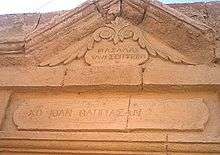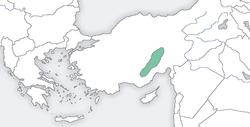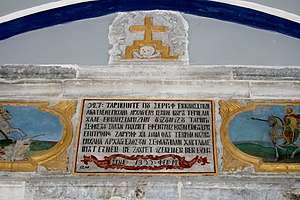Karamanlides
The Karamanlides (Greek: Καραμανλήδες; Turkish: Karamanlılar), or simply Karamanlis, are a Greek-Orthodox, Turkish-speaking people native to the Karaman and Cappadocia regions of Anatolia. Today, a majority of the population live within Greece, though there is a notable diaspora in Western Europe and North America.
Καραμανλήδες Karamanlılar | |
|---|---|
 Karamanlidika inscription found on the door of a house in İncesu, Turkey | |
| Regions with significant populations | |
| Greece | |
| Languages | |
| Originally Karamanli Turkish, now predominantly Modern Greek | |
| Religion | |
| Orthodox Christianity |
Etymology
Karamanlides were Greek-Orthodox Christians in Central Anatolia who spoke Turkish as their primary language. The term is geographical, derived from the 13th century Beylik of Karaman. This was the first Turkish kingdom to use Turkish as its official language and originally the term would only refer to the inhabitants of the town of Karaman or from the region of Karaman.
Language
Historically, the Karamanlides spoke Karamanlı Turkish. Its vocabulary drew overwhelmingly from Turkic words with many Greek loan words. The language should not be confused with Cappadocian Greek, which was spoken in the same region during the same timeframe, but is derived from the Greek language. While the official Ottoman Turkish was written in the Arabic script, the Karamanlides used the Greek alphabet for writing its form of Turkish. Such texts are called Karamanlidika (Καραμανλήδικα / Καραμανλήδεια γραφή) or Karamanlı Turkish today. Karamanlı Turkish had its own literary tradition and produced numerous published works in print in the 19th century, some of them published by Evangelinos Misailidis, by the Anatoli or Misailidis publishing house (Misailidis 1986, p. 134).
Karamanlı writers and speakers were expelled from Turkey as part of the Greek-Turkish population exchange of 1923. Some speakers preserved their language in the diaspora. The writing form stopped being used immediately after the Turkish state adopted the Latin alphabet.
A fragment of a manuscript written in Karamanlı was also found in the Cairo Geniza.[1]
Origins
The origins of the Karamanlides have long been disputed, there being two basic theories on the subject. According to one, they are the remnants of the Greek-speaking Byzantine population which, though it remained Orthodox, was linguistically Turkified. The second theory holds that they were originally Turkish soldiers which the Byzantine emperors had settled in Anatolia in large numbers and who retained their language and Christian religion after the Turkish conquests.[2]

Population
Many Karamanlides were forced to leave their homes during the 1923 population exchange between Greece and Turkey. Early estimates placed the number of Orthodox Christians expelled from central and southern Anatolia at around 100,000.[3] However, the Karamanlides were numbered at around 400,000 at the time of the exchange.[4]
The former prime minister of Greece, Karamanlis has his roots in Karaman.
Culture
The distinct culture that developed among the Karamanlides blended elements of Orthodox Christianity with a Greek-Ottoman flavor that characterized their willingness to accept and immerse themselves in foreign customs. From the 14th to the 19th centuries, they enjoyed an explosion in literary refinement. Karamanli authors were especially productive in philosophy, religious writings, novels, and historical texts. Lyrical poetry in the late 19th century describes their confusion they felt as a Turkish-speaking people with a Greek ethos,a problem which reminds the German-speaking French people of Lorraine and the French-speaking English people.
References
- Julia Krivoruchko Karamanli – a new language variety in the Genizah: T-S AS 215.255 http://www.lib.cam.ac.uk/Taylor-Schechter/fotm/july-2012/index.html Archived 2016-10-27 at the Wayback Machine
- Vryonis, Speros. Studies on Byzantium, Seljuks, and Ottomans: Reprinted Studies. Undena Publications, 1981, ISBN 0-89003-071-5, p. 305. "The origins of the Karamanlides have long been disputed, there being two basic theories on the subject. According to one, they are the remnants of the Greek-speaking Byzantine population which, though it remained Orthodox, was linguistically Turkified. The second theory holds that they were originally Turkish soldiers which the Byzantine emperors had settled in Anatolia in large numbers and who retained their language and Christian religion after the Turkish conquests..."
- Blanchard, Raoul. "The Exchange of Populations Between Greece and Turkey." Geographical Review, 15.3 (1925): 449-56.
- Pavlowitch, Stevan K. A History of the Balkans, 1804-1945. Longman, 1999, ISBN 0-582-04585-1, p. 36. "The karamanlides were Turkish-speaking Greeks or Turkish-speaking Orthodox Christians who lived mainly in Asia Minor. They numbered some 400,000 at the time of the 1923 exchange of populations between Greece and Turkey."
